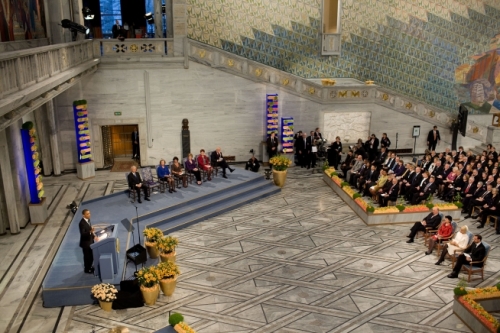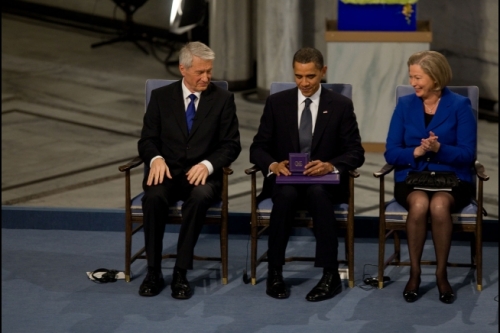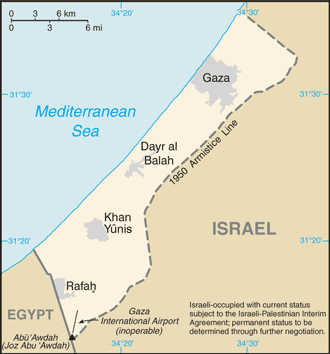
President Barack Obama delivers remarks during the Nobel Peace Prize ceremony in Raadhuset Main Hall at Oslo City Hall, Dec. 10, 2009. (Official White House Photo by Pete Souza)
Thank you, Mr. President, for encouraging an open and vigorous debate, and for seeking Congressional authority to use military force in Syria. Hopefully, you and our members of Congress are hearing from many Americans.
We are a divided nation, and it seems we are very divided about using military force in Syria. Perhaps the pollsters aren’t asking Americans the right question.
I’ve read your draft resolution that you sent to Capitol Hill on Saturday. You are framing the issue as a limited military response in Syria to deter or prevent the use and proliferation of weapons of mass destruction (including chemical or biological weapons).
Respectfully, I believe framing the issue that way is problematic for several reasons:
- The United States did not object to Saddam Hussein’s use of chemical weapons against the Iranian military in 1988. In fact, some commentators suggest recently declassified materials show that the US assisted Hussein. The US didn’t object to Israel’s use of white phosphorus against a defenseless civilian population in Gaza during Operation Cast Lead, which international law clearly prohibits. Furthermore, a US intelligence document says President Assad has used chemical weapons in the recent past, perhaps as many as 14 times. These inconsistent responses have damaged America’s credibility in the Middle East. America can’t pick and choose which atrocities it will condemn. Only a brave new foreign policy approach in the region has a chance of restoring the international community’s trust and respect in America as a leader for good.
- There is considerable uncertainty about who actually used these chemical weapons in Damascus on August 21. Very likely it was President Assad, as you and Secretary of State John Kerry believe. Assad denies it, however, and others ask for the evidence to clearly prove the link to Assad. Now the Assad regime has asked the UN to protect it from ‘any aggression’ from the West, while President Vladimir Putin said Russia “doesn’t exclude” supporting a U.N. resolution on punitive military strikes if it is proven that Damascus used poison gas on its own people. There are many players in the region, each with their own agenda, and others could have plausibly hit these neighborhoods in Damascus in order to draw the US into this quagmire for their own reasons.
- There is no end game, and there’s very good reason to believe that the Middle East is a powder keg just waiting to be ignited. Assad has promised to retaliate, and others in the region are already preparing their responses. It won’t end with an airstrike or two or many. The potential loss of life is incalculable.
- As a former law professor yourself, you may appreciate the counsel provided by these three law professors who say that the U.N. Charter requires nations to work together through the United Nations to address atrocities such as we see today in Syria. Oona A. Hathaway and Scott J. Shapiro are professors at Yale Law School and write here. Professor Jennifer Moore, University of New Mexico School of Law writes here.
President Barack Obama looks at the Nobel Prize medal and diploma during the Nobel Peace Prize ceremony in Raadhuset Main Hall at Oslo City Hall, Dec. 10, 2009. (Official White House Photo by Pete Souza)
Mr. President, you have been handed an opportunity to do something extraordinary for Syria and for the world.
The members of the Nobel Peace Prize Committee saw a  spark of greatness in you when they bestowed the Nobel Prize medal on you in 2009. Many Americans saw hope. I think the current events in Syria provide you with the opportunity to prove them all right.
spark of greatness in you when they bestowed the Nobel Prize medal on you in 2009. Many Americans saw hope. I think the current events in Syria provide you with the opportunity to prove them all right.
Rather than framing the issue as a limited military response in Syria to the illegal use of chemical weapons, you should frame the issue as a global response to building long-term peace in the Middle East. You are perhaps the only person in the world today who can frame the issue this way, bring all of the parties together on the same page, and actually implement a plan for long-term peace.
Former President Jimmy Carter, your fellow Nobel Peace Laureate (2002), is calling for a Syria Peace Summit. Another Nobel Peace Laureate Mairead Maguire (1976) recently visited Lebanon and Syria and says that the Syrians she met do not want the international community to intervene. She speaks about her visit here.
Many people are perplexed about what to do about Syria. Respectfully, these are the steps I recommend you take.
- Invite President Carter and Mairead Maguire to the White House to discuss with you and your advisers the next steps they would recommend. The invitation alone will signal to the world that you are considering other options and possibly reframing the issue. Remember that peace is not a sign of weakness; an airstrike is not a sign of strength. In fact, it is exactly the opposite.
- The Syrians on the ground and in harms way must be sent large quantities of anti-toxins for the chemical weapons that have been used and believed to be existing, in order to be prepared for the worse case scenario. Pull together a medical force, rather than a military force, of professionals who will voluntarily travel to Syria to tend to the injured. The U.S. government should compensate this medical force just as it compensates the military force currently sitting in the Mediterranean.
- There are now more than 2 million Syrian refugees fleeing from their homeland. Direct your Administration to prepare guidelines for accepting Syrians into the USA, and implement these guidelines before the end of the year.
- Issue a statement that the use of chemical weapons, weapons of mass destruction, and weapons prohibited under international law against civilians by any nation or non-state actor (including Iran and Israel) will be met by swift and powerful condemnation by the United States, and an immediate cessation of any economic, military and bilateral relations. (The resolution you presented to Congress last Saturday should be redrafted to seek this authorization.)
- There must be a unified and consistent response by the global community to non-state actors and extremists, like Al-Qaeda, who indiscriminately brutalize civilians and “infidels”. Avoid the term “terrorists” which has been overused, misused and mocked.
Undoubtedly you’ll receive push back from every side. I suspect Netanyahu has already bent your ear for delaying an airstrike in Syria.
Please don’t fall into the trap that others will lay for you — that the U.S. must launch an airstrike in Syria to restore our country’s credibility in the region; to punish Assad for stepping across a red line; or to thwart the proliferation of this dangerous menace (chemical weapons). YOU set the agenda — and make it one of long-term peace and stability in the region. Carter and Maguire are your best allies and counselors. Please send them an invitation to meet with you post haste.



Saying that the US (or any nation) can’t or shouldn’t act in response to chemical weapons because we haven’t acted before really annoys me. Ultimately, it means no one can reform! That said, what has most people stymied is the lack of an appropriate non-violent response. Thank you for providing some!
Jeff, My point is that we (the US) does not have the moral authority to punish Assad for using chemicals weapons when we, in fact, have used chemical weapons illegally and we have turned our backs when our “friends” have used chemical weapons.
Thank you Lora.
Excellent response
Pingback: Some moral clarity on the Syria strikes - Middle East Experience
So well articulated. So well thought out. You have shed light on a way forward to a better world. Not a cliche to those who might have been killed in a military action, or the earth that bears the damage we continue to inflict.
This is impressive, Lora Lucero. Run for President! Thank you, Glen
Excellent letter!
Totally agree. We should not take military action of any kind against Syria. They need to sort out their own problems. Hope Pres. Obama opens his ears and listens to the rest of the world community.